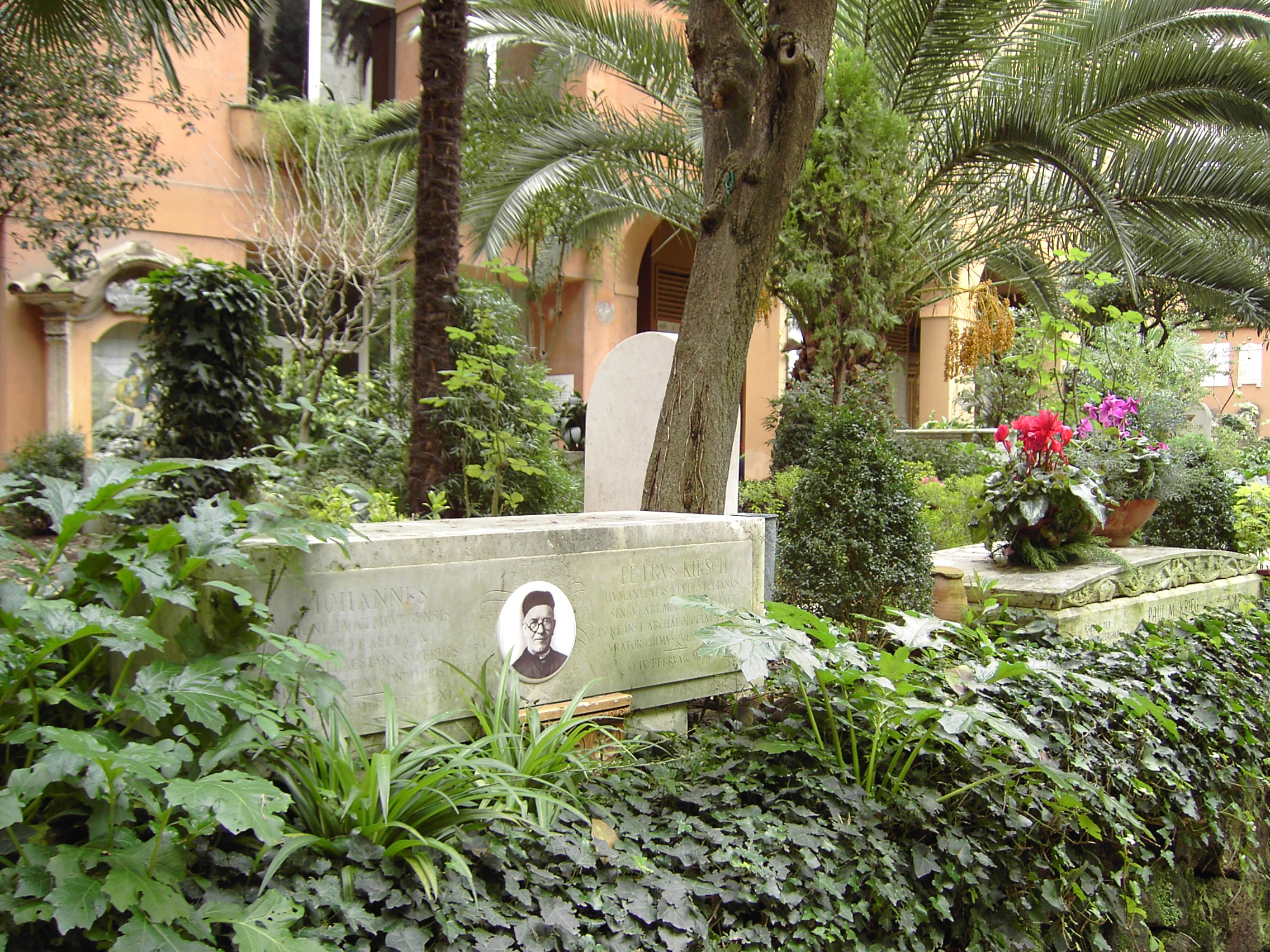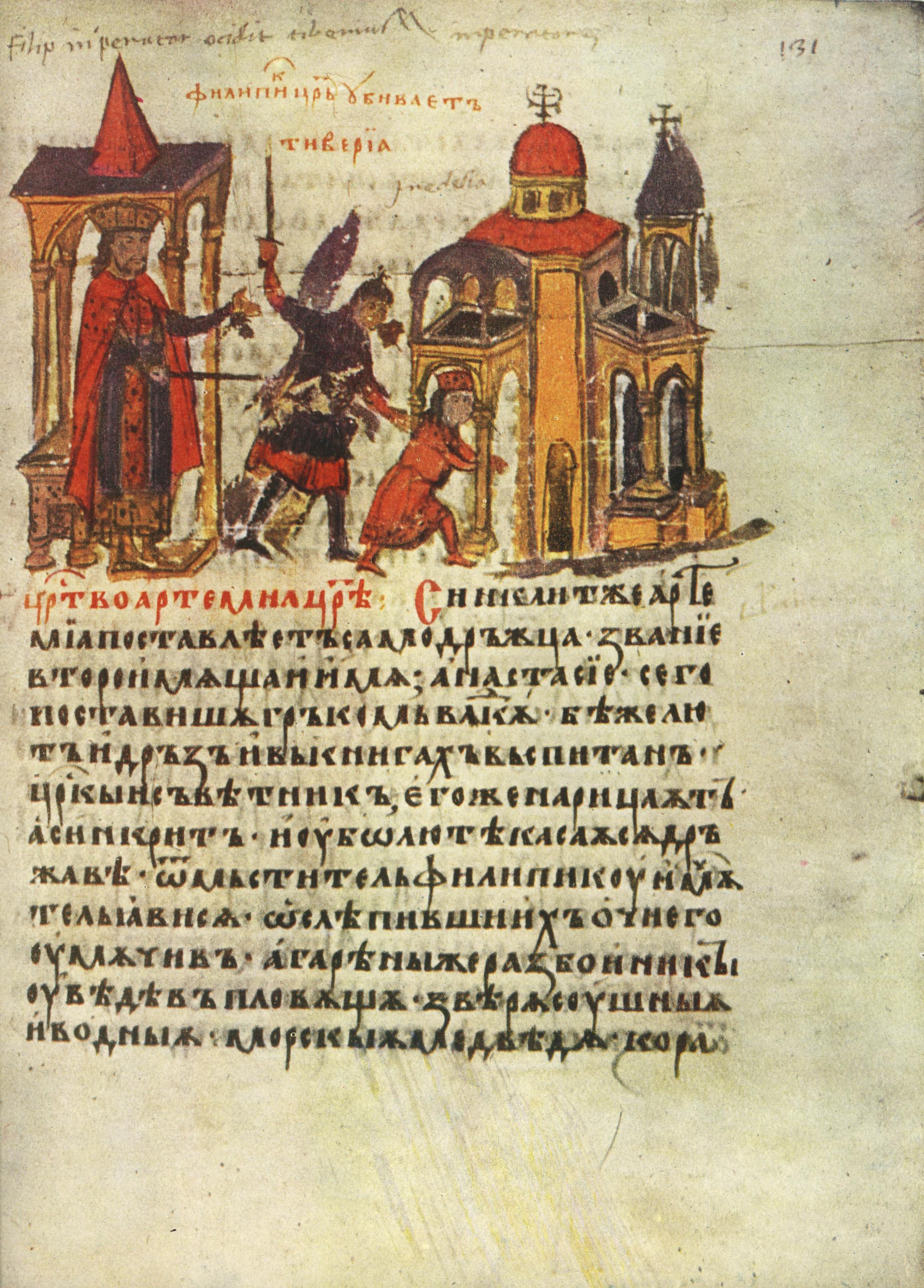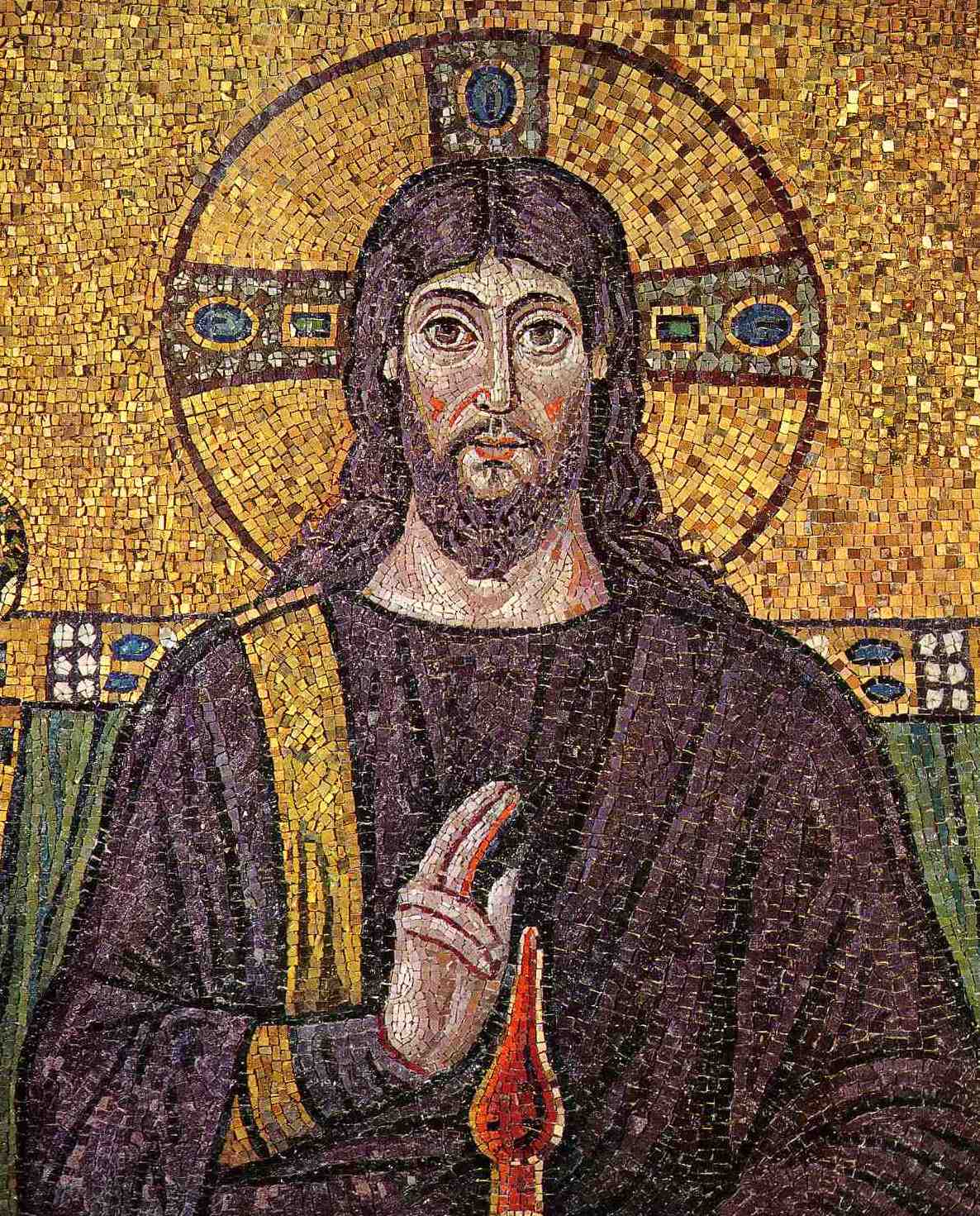|
Germanus I Of Constantinople
Germanus I of Constantinople (, Greek: Γερμανός; 634 – 742) was the Ecumenical Patriarch of Constantinople from 715 to 730. He is regarded as a saint by both the Orthodox and Catholic Churches, with a feast day of 12 May. He had been ecumenically preceded by Patriarch John VI of Constantinople, and was succeeded in Orthodox Rite by Patriarch Anastasius of Constantinople. Life According to Theophanes the Confessor, Germanus I was a son of a patrician named Justinian, who was executed in 668. Justinian was reportedly involved in the murder of Constans II and usurpation of the throne by Mizizios. Emperor Constantine IV, son of Constans II, defeated his rival and punished the supporters of Mizizios. Germanus I survived the persecutions but was made a eunuch by the victors. Germanus I was sent to a monastery but resurfaced as the Bishop of Cyzicus. He took part in the Council of Constantinople in 712, a gathering which issued decisions favoring Monothelitism, ther ... [...More Info...] [...Related Items...] OR: [Wikipedia] [Google] [Baidu] |
Saint
In Christianity, Christian belief, a saint is a person who is recognized as having an exceptional degree of sanctification in Christianity, holiness, imitation of God, likeness, or closeness to God in Christianity, God. However, the use of the term ''saint'' depends on the context and Christian denomination, denomination. In Anglican Communion, Anglican, Oriental Orthodox, and Lutheranism, Lutheran doctrine, all of their faithful deceased in Heaven are considered to be saints, but a selected few are considered worthy of greater honor or emulation. Official Ecclesiastical polity, ecclesiastical recognition, and veneration, is conferred on some denominational saints through the process of canonization in the Catholic Church or glorification in the Eastern Orthodox Church after their approval. In many Protestant denominations, and following from Pauline usage, ''saint'' refers broadly to any holy Christian, without special recognition or selection. While the English word ''saint'' ... [...More Info...] [...Related Items...] OR: [Wikipedia] [Google] [Baidu] |
Eunuch
A eunuch ( , ) is a male who has been castration, castrated. Throughout history, castration often served a specific social function. The earliest records for intentional castration to produce eunuchs are from the Sumerian city of Lagash in the 2nd millennium BCE. Over the millennia since, they have performed a wide variety of functions in many different cultures: courtiers or equivalent Domestic worker, domestics, for espionage or clandestine operations, ''castrato'' singers, Concubinage, concubines or sexual partners, religious specialists, soldiers, royal guards, government officials, and guardians of women or harem servants. Eunuchs would usually be servants or Slavery, slaves who had been castrated to make them less threatening servants of a royal court where physical access to the ruler could wield great influence. Seemingly lowly domestic functions—such as making the ruler's bed, bathing him, cutting his hair, carrying him in his litter (vehicle), litter, or even rel ... [...More Info...] [...Related Items...] OR: [Wikipedia] [Google] [Baidu] |
Armenian Apostolic Church
The Armenian Apostolic Church () is the Autocephaly, autocephalous national church of Armenia. Part of Oriental Orthodoxy, it is one of the most ancient Christianity, Christian churches. The Armenian Apostolic Church, like the Armenian Catholic Church, belongs to the Armenian Rite. The Kingdom of Armenia (antiquity), Kingdom of Armenia was the first state in history to adopt Christianity as its official religion (under the Armenian Apostolic traditions) during the rule of Tiridates III of Armenia, King Tiridates III, of the Arsacid dynasty of Armenia, Arsacid dynasty in the early 4th century. According to tradition, the church originated in the missions of Apostles Bartholomew the Apostle, Bartholomew and Jude the Apostle, Thaddeus (Jude) in the 1st century. St. Gregory the Illuminator was the first official primate (bishop), primate of the church. It is sometimes referred to as the Armenian Apostolic Orthodox Church, Armenian Church or Armenian Gregorian Church. The Armenian Ap ... [...More Info...] [...Related Items...] OR: [Wikipedia] [Google] [Baidu] |
Anathema
The word anathema has two main meanings. One is to describe that something or someone is being hated or avoided. The other refers to a formal excommunication by a Christian denomination, church. These meanings come from the New Testament, where an anathema was a person or thing cursed or condemned by God. In the Old Testament, an anathema was something or someone cursed and separated from God because of sin. These represent two types of settings, one for devotion, the other for destruction. Etymology Anathema derives from Ancient Greek: , , meaning "an offering" or "anything dedicated", itself derived from the verb , , meaning "to offer up". In the Old Testament, חֵרֶם (''Herem (censure), chērem'') referred to both objects consecrated to divine use and those dedicated to destruction in the Lord's name, such as enemies and their weapons during religious wars. Since weapons of the enemy were considered unholy, the meaning became "anything dedicated to evil" or "a curse". I ... [...More Info...] [...Related Items...] OR: [Wikipedia] [Google] [Baidu] |
Dyothelitism
Dyothelitism or dithelitism (from Greek δυοθελητισμός "doctrine of two wills") is the Christological doctrine that teaches the existence of two wills (divine and human) in the person of Jesus Christ. Specifically, dyothelitism correlates the distinctiveness of two wills with the existence of two specific natures (divine and human) in the person of Jesus Christ, in a dyophysite context. History Dyothelitism as a position stands in opposition to the view of monothelitism, the doctrine of Jesus having one will, in Christological thought. Dyothelitism was championed by Maximus the Confessor. The conflict arose between varying views of the constitution of a 'person' and 'will': monothelites believe that a single person can only possess a single will without arising in conflict, whereas dyothelites emphasize the perfect humanity in Christ's nature. The debate concerning the monothelite and dithelite churches came to a conclusion at the Third Council of Constantinople ... [...More Info...] [...Related Items...] OR: [Wikipedia] [Google] [Baidu] |
Theodosius III
Theodosius III () was Byzantine emperor from to 25 March 717. Before rising to power and seizing the throne of the Byzantine Empire, he was a tax collector in Adramyttium. In 715, the Byzantine navy and the troops of the Opsician Theme, one of the Byzantine provinces, revolted against Emperor Anastasius II (), acclaiming the reluctant Theodosius as emperor. Theodosius led his troops to Chrysopolis and then Constantinople, the capital, seizing the city in November 715. Anastasius did not surrender until several months later, accepting exile in a monastery in return for safety. Many themes viewed Theodosius to be a puppet of the troops of the Opsician Theme, and his legitimacy was denied by the Anatolics and the Armeniacs under their respective (generals) Leo the Isaurian and Artabasdos. Leo declared himself emperor in the summer of 716 and allied himself with the Umayyad Caliphate, the Islamic empire; Theodosius sought aid from the Bulgarians under Khan Tervel (), sett ... [...More Info...] [...Related Items...] OR: [Wikipedia] [Google] [Baidu] |
Anastasius II (emperor)
Anastasius II (; died 719), born Artemius (, was the Byzantine emperor from 713 to 715. His reign was marked by significant religious and political decisions aimed at stabilizing the Empire. One of his notable actions was reversing the previous appointment of a Monothelete patriarch of Constantinople, instead reinstating Orthodoxy by appointing Germanus I to the position. This move was made in an effort to gain the favor of Pope Constantine. Anastasius II dedicated his efforts to fortifying the Empire and fostering a period of stability. However, his reign was cut short when he was deposed by Theodosius III during the Byzantine campaign against the Umayyad Caliphate in 715. Undeterred, four years later, in 719, Anastasius launched a rebellion against Leo III the Isaurian in a bid to reclaim the imperial throne. Initially, Anastasius received support from Tervel of Bulgaria, who provided soldiers and funds for his cause. However, the situation took a turn when Anastasius failed ... [...More Info...] [...Related Items...] OR: [Wikipedia] [Google] [Baidu] |
Catholic Encyclopedia
''The'' ''Catholic Encyclopedia: An International Work of Reference on the Constitution, Doctrine, Discipline, and History of the Catholic Church'', also referred to as the ''Old Catholic Encyclopedia'' and the ''Original Catholic Encyclopedia'', is an English-language encyclopedia about Catholicism published in the United States. It was designed "to give its readers full and authoritative information on the entire cycle of Catholic interests, action and doctrine". The first volume of the ''Catholic Encyclopedia'' appeared in March 1907 and the last three volumes appeared in 1912, followed by a master index volume in 1914 and later supplementary volumes. Its successor, the ''New Catholic Encyclopedia'', was first published by the Catholic University of America in 1967. ''The'' ''Catholic Encyclopedia'' was published by the Robert Appleton Company (RAC) in New York City. RAC was a publishing company incorporated in February 1905 for the express purpose of publishing the ency ... [...More Info...] [...Related Items...] OR: [Wikipedia] [Google] [Baidu] |
Johann Peter Kirsch
Johann Peter Kirsch (3 November 1861 – 4 February 1941) was a Luxembourgish ecclesiastical historian and biblical archaeologist. Life Johann Peter Kirsch was born in Dippach, Luxembourg, the son of Andreas and Katherine Didier Kirsch. At the age of ten, he went to live with his maternal uncle, Johann Jakob Didier, a priest at Fels. He began his high school education at the Atheneum, and then went to the seminary. He was ordained a priest on 23 August 1884. That autumn he was sent to Rome to attend the Collegio Teutonico. From 1884 to 1890 he studied archeology, paleography and diplomacy at the Collegio Apollinare and at other papal universities in Rome. Kirsch was a student of renowned archaeologist Giovanni Battista de Rossi. In 1887 he was a co-founder of the "Roman Quarterly". In the spring of 1888, he and Francesco Saverio Cavallari studied inscriptions and catacombs in Syracuse; in Naples he examined lead bulls. That December, Kirsch became the first Director of t ... [...More Info...] [...Related Items...] OR: [Wikipedia] [Google] [Baidu] |
Philippicus
Philippicus (; ), born Bardanes (; ) was Byzantine emperor from 711 to 713. He took power in a coup against the unpopular emperor Justinian II, and was deposed in a similarly violent manner nineteen months later. During his brief reign, Philippicus supported monothelitism in Byzantine theological disputes, and saw conflict with the First Bulgarian Empire and the Umayyad Caliphate. Biography Philippicus was originally named Bardanes (; ); he was the son of the patrician Nicephorus, who was of Armenian extraction from an Armenian colony in Pergamum. The Armenian background of Philippicus has been supported by Byzantinist historians Peter Charanis and Nicholas Adontz, and disputed by Anthony Kaldellis. Kaldellis adds that Bardanes was probably born and raised in the Byzantine realm, as his father Nicephorus possibly was. Contemporaneous sources attest to Bardanes' tutoring, scholarly interests, learning and eloquence, all of which were in Greek. Byzantine historians Leslie Brubaker ... [...More Info...] [...Related Items...] OR: [Wikipedia] [Google] [Baidu] |
Third Council Of Constantinople
The Third Council of Constantinople, counted as the Sixth Ecumenical Council by the Eastern Orthodox and Catholic Churches, and by certain other Western Churches, met in 680–681 and condemned monoenergism and monothelitism as heretical and defined Jesus Christ as having two energies and two wills (divine and human). George Ostrogorsky, ''History of the Byzantine State'' (Rutgers University Press, 1995), 127. Background The council settled a set of theological controversies that went back to the sixth century but had intensified under the emperors Heraclius () and Constans II (). Heraclius had set out to recover much of the part of his empire lost to the Persians and had attempted to bridge the controversy with monophysitism, which was particularly strong in Syria and Egypt, by proposing a moderate theological position that had as good support in the tradition as any other. The result was first monoenergism, i.e., that Christ, though existing in two natures (divine and ... [...More Info...] [...Related Items...] OR: [Wikipedia] [Google] [Baidu] |
Monothelitism
Monothelitism, or monotheletism was a theological doctrine in Christianity that was proposed in the 7th century, but was ultimately rejected by the sixth ecumenical council. It held Christ as having only one will and was thus contrary to dyothelitism, the Christological doctrine accepted by most Christian denominations, which holds Christ as having two wills (divine and human). Historically, ''monothelitism'' was closely related to monoenergism, a theological doctrine that holds Jesus Christ as having only one energy. Both doctrines were at the center of Christological disputes during the 7th century. Monothelitism is from . Theological notions related to the ''oneness'' of Christ's will emerged as a result of some earlier Christological controversies that were related to monophysitism as formulated by Eutyches (d. 456) and miaphysitism as formulated by non-Chalcedonian followers of Cyril of Alexandria (d. 444). Since the notion of Christ's ''one nature'' implied the ''onenes ... [...More Info...] [...Related Items...] OR: [Wikipedia] [Google] [Baidu] |





